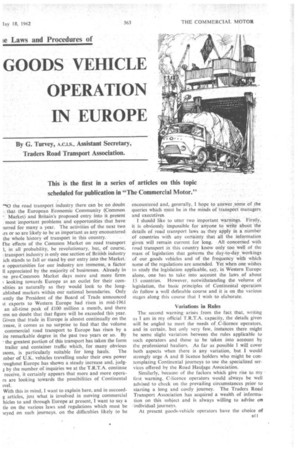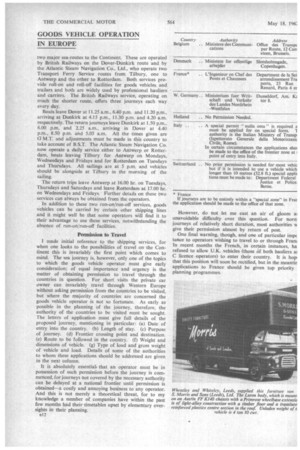GOODS VEHICLE OPERATION IN EUROPE
Page 45

Page 46

If you've noticed an error in this article please click here to report it so we can fix it.
This is the first in a series of articles on this topic scheduled for publication in "The Commercial Motor." By G. Turvey, Assistant Secretary, Traders Road Transport Association.
-10 the road transport industry there can be no doubt that the European Economic Community (Common Market) and Britain's proposed entry into it present most important problems and opportunities that have ;urred for many a year. The activities of the next two IS or so are likely to be as important as any encountered the whole history of transport in this country.
[he effects of the Common Market on road transport 1, in all probability, be revolutionary, but, of course, : transport industry is only one section of British industry ich stands to fall or stand by our entry into the Market, e opportunities for our industry are immense, a factor It appreciated by the majority of businesses. Already in ;se pre-Common Market days more and more firms looking towards Europe as an outlet for their cornidities as naturally as they would look to the longablished markets within our national boundaries. Only :ently the President of the Board of Trade announced it exports to Western Europe had risen in mid-1961 an all-time peak of £100 million a month, and there ;ms no doubt that that figure will be exceeded this year. Given that trade in Europe is almost continually on the :rease, it comes as no surprise to find that the volume commercial road transport to Europe has risen by a ite remarkable degree in the past two years or so. By the greatest portion of this transport has taken the form trailer and container traffic which, for many obvious isons, is particularly suitable for long hauls, The rnber of U.K. vehicles travelling under their own power :.oughout Europe has shown a steady increase and, judg; by the number of inquiries we at the T.R.T.A. continue receive, it certainly appears that more and more operars are looking towards the possibilities of Continental ivel.
With this in mind, I want to explain here, and in succeedg articles, just what is involved in moving commercial hides to and through Europe at present, I want to say a tle on the various laws and regulations which must be ieyed on such journeys, on the difficulties likely to be encountered and generally, I hope to answer some of the queries which rnust be in the minds of transport managers, and executives I should like to utter two important warnings. Firstly, it is obviously impossible for anyone to write about the details of road transport laws as they apply in a number of countries with any certainty that all the information given will remain current for long. All concerned with road transport in this country know only too well of the mass of legislation that governs the day-to-day. workings of our goods vehicles and of the frequency with which some of the regulations are amended. Yet when one wishes to study the legislation applicable, say, in Western Europe alone, one has to take into account the laws of about 15 countries. However, notwithstanding the volume of legislation, the basic principles of Continental operation do follow a well definable course and it is on the various stages along this course that I wish to elaborate.
Variations in Rules The second warning • arises from the fact that, writing as I am in my official T.R.T.A. capacity, the details given will be angled to meet the needs of C-licence operators, and in certain, but only very few, instances there might be some slight variation between the rules applicable to such operators and those to be taken into account by the professional hauliers. As far as possible I will cover both aspects when there is any variation, but I would strongly urge A and B licence holders who might be contemplating Continental journeys to use the specialized services offered by the Road Haulage Association.
Similarly, because of the factors which give rise to my first warning, C-licence operators would always be well advised to check on the prevailing circumstances prior to starting a long and costly journey. The Traders Road Transport Association has acquired a wealth of information on this subject and is always willing to advise on :individual journeys.
At present goods-vehicle operators have the choice of
two major sea-routes to the Continent. These are operated by British Railways on the Dover-Dunkirk route and by the Atlantic Steam Navigation Co., Ltd., who operate two Transport Ferry Service routes from Tilbury, one to Antwerp and the other to Rotterdam. Both services provide roll-on and roll-off facilities for goods vehicles and trailers and both are widely used by professional hauliers and carriers. The British Railways service, operating on much the shorter route, offers three journeys each way every day.
Boats leave Dover at 11.25 a.m., 6.40 p.m. and 11.20 p.m., arriving at Dunkirk at 4.15 p.m., 11.30 p.m. and 4.20 a.m. respectively. The return journeys leave Dunkirk at 1.50 p.m„ 6.00 p.m, and 2.25 a.m., arriving in Dover at 4.40 p.m., 8.50 p.m. and 5.05 a.m. All the times given are G M.T. and adjustments must be made in this country to take account of B.S.T. The Atlantic Steam Navigation Ca now operate a daily service either to Antwerp or Rotterdam, boats leaving Tilbury for Antwerp on Mondays, Wednesdays and Fridays and for Rotterdam on Tuesdays and Thursdays. All sailings are at 5 p.m. and vehicles should be alongside at Tilbury in the morning of the sailing.
The return trips leave Antwerp at 16.00 hr. on Tuesdays, Thursdays and Saturdays and leave Rotterdam at 17.00 hr. on Wednesdays and Fridays. Further details on these two services can always be obtained from the operators.
In addition to these two run-on/run-off services, goods vehicles can be carried by certain other shipping lines and it might well be that some operators will find it to their advantage to use these services, notwithstanding the absence of run-on/run-off facilities.
Permission to Travel
I made initial reference to the shipping services, for when one looks to the possibilities of travel on the Continent this is invariably the first point which comes to mind. The sea journey is, however, only one of the topics to which the goods vehicle operator must give early consideration; of equal importance and urgency is the matter of obtaining permission to travel through the countries in question. For short visits the private car owner can invariably travel through Western Europe without asking permission from the countries to be visited, but where the majority of countries are concerned the goods vehicle operator is not so fortunate. As early as possible in the planning of the journey, therefore, the authority of the countries to be visited must be sought. The letters of application must give full details of the proposed journey, mentioning in particular: (a) Date of entry into the country. (b) Length of stay. (c) Purpose of journey. (d) Frontier crossing point and destination. (e) Route to be followed in the country. (1) Weight and dimensions of vehicle. (g) Type of load and gross weight of vehicle and load. Details of some of the authorities to whom these applications should be addressed are given in the next column.
It is absolutely essential, that an operator must be in possession of such permission before the journey is commenced, for journeys not covered by the necessary authority can be delayed at a national frontier until permission is obtained—a costly and annoying business to any operator. And this is not merely a theoretical threat, for to my knowledge a number of companies have within the past few months had their timetables upset by elementary oversights in their planning. * France If journeys are to be entirely within a "special zone" in Frar the application should be made to the office of that zone.
However, do not let me cast an air of gloom a unavoidable difficulty over this question. For nornjourneys of relatively short duration, most authorities NS give their permission almost by return of post.
One final warning, though, and one of particular imp( tance to operators wishing to travel to or through Fran, In recent months the French, in certain instances, ha refused to allow U.K. vehicles (those of both hauliers ai C licence operators) to enter their country. It is hop that this position will soon be rectified, but in the meantir applications to France should be given top priority planning programmes.




















































































































